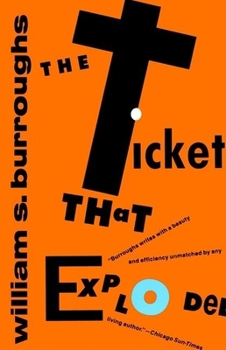Book Overview
In The Ticket That Exploded, William S. Burroughs's grand cut-up trilogy, which began with The Soft Machine and continues through Nova Express, reaches its climax as Inspector Lee and the Nova Police... This description may be from another edition of this product.
Format:Paperback
Language:English
ISBN:0802151507
ISBN13:9780802151506
Release Date:January 1994
Publisher:Grove Press
Length:217 Pages
Weight:0.70 lbs.
Dimensions:0.6" x 5.4" x 8.3"
Related Subjects
Contemporary Fiction Literary Literature & Fiction Science Fiction Science Fiction & FantasyCustomer Reviews
5 ratings
A Must Reread
Published by Thriftbooks.com User , 20 years ago
Burroughs's The Ticket that Exploded, the second installment of this early trilogy (The Soft Machine and Nova Express, respectively) is a literary pleasure. It encompasses many ideas (Jung's Synchronicity, Foucault's Structuralism, Korzybski's linguistic theories, to name a few) in a post-modernist style. With many texts in the post-structuralism/post-modernist period and vein-like Joyce's Finnegans Wake and Pynchon's Gravity's Rainbow-this book teaches the reader how to read the text as one continues through the work. As such, it is a must reread, for as entertaining as the work is throughout the first reading, Ticket is more interesting and more insightful with each successive read.
"cut-up" masterpiece
Published by Thriftbooks.com User , 21 years ago
Out of the three books in Burroghs' "cut-up" trilogy (the soft machine, the ticket that exploded, and nova express) this i feel is the best and most creative. Included in this book are Ginsyn's tape recorder experiments which produce a psychological analogy for the way our brains opperate as well as an interesting pass-time for anyone who finds the concept of words being a virus of the mind of any interest.
Possibly "better" and more insightful than "Naked Lunch"
Published by Thriftbooks.com User , 24 years ago
This book is the final word in cut-ups and Burroughs' tape experiments of the early 1960's. This is Burroughs' most beautifully written text, if somewhat overrepetitive at times. Moreso than in "Naked Lunch" or in "Nova Express," Burroughs fleshes out his ideas about language "being a virus from outer space," and looks forward to his essay, "The Electronic Revolution." This is a tough and uncompromising book, filled with beautiful nonsequitors, funny anecdotal tales, and plenty homoerotic sexual fantasies and realitease.
Soundbite #1 No revloutions ever
Published by Thriftbooks.com User , 25 years ago
It is difficult to attach the concept of attainment and climax to Burrough's texts, the act of reading as a sexual encounter is never teleoligcial: as an historical moment, and these moments lace in and out of his work, The Ticket That Exploded marks the final move in his journey through Nova control lines and the elucidation of techniques of subversion. The text marks a cleft and an absence rather than a revolution, which Burrough's shows to be an act always already ingested by Nova logic. "Nova" itself signs the problematics of the new and original. The words writhe uneasily in gestures of self canabalism, and indeed here is one of the few places where the author speaks explicitly of repetition. Deleuze reading Burroughs...Burrroughs reading Deleuze? Neither. The Law is moving in - This is Nova Heat. Once the movement to Difference occurs, and to my mind this is located as a singularity in the last quarter of the text, the text is freed and seethes in a vertical spiral about any singular point in the work. This is a horizontal play of words in which chance regulates a different logic of alterity. We as readers are free to pin the work at any point with the stabbing singualrity of an "I" (the nails from a crucified God?). We are free to chose our own Sils Marias. This work is a monstruous and ephemeral monument to the hollow idols of our Humanity. It is a payground of chance. "do you get the picture" Read the text and feel yourself re-written. "Even better than the real thing? There is no real thing - Maya Maya - it's all show business"
Mimetic
Published by Thriftbooks.com User , 26 years ago
Yes, it's a cut-up. Yes, it can be difficult to read, but what Burrough's accomplishes is the denial of Derridia/Lacanian deconstructionism that is so rife in current textual analysis. By his explicit "cuting word lines," and efficiency Burroughs disallows the reader a moment to decompose his catacombs of metaphor and derive subtextual data. Like all masterpieces, TTTE is mimetic, as it functions as a text exactly the way Burroughs explicitly states language should function. This book broke down my established mental habits of textual analysis created by a liberal arts degree, and brought me to some frightening parallels between Derridian deconstruction and Burrough's "word lines."




